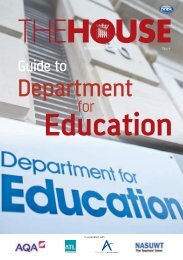Oracy
2fcBkno
2fcBkno
Create successful ePaper yourself
Turn your PDF publications into a flip-book with our unique Google optimized e-Paper software.
The applicability of oracy-based activities is more obvious to teachers of some subjects than others.<br />
Maths and science teachers, for example, are significantly more likely to feel oracy-based activities are<br />
not relevant in their subject than English or history teachers. xxxvi<br />
“My subject does not lend itself to these activities”<br />
40%<br />
35%<br />
32%<br />
20%<br />
19%<br />
17%<br />
0%<br />
Music<br />
(20)<br />
Mathematics<br />
(84)<br />
Business<br />
Studies<br />
(27)<br />
Science<br />
(69)<br />
9%<br />
7%<br />
Computing or Languages<br />
Information and (58)<br />
Communication<br />
Teachnology<br />
(ICT) (22)<br />
5%<br />
Religious<br />
Education<br />
(Religious<br />
Studies, R.E.,<br />
RS) (21)<br />
1%<br />
English<br />
(102)<br />
0%<br />
History<br />
(38)<br />
“We have some drama teachers who teach English and when you go into their<br />
classroom nobody’s ever sitting there writing, they’re always talking and acting<br />
and doing much more active things, so it depends very much on your teacher”<br />
Mark Crossley, English teacher & Key Stage 4 Coordinator King Edward VI School<br />
Difficulties in seeing links between oracy<br />
and certain subjects are not limited to<br />
secondary school teachers, however.<br />
Primary teachers can also find it challenging<br />
to embed oracy across the full range of<br />
subjects as Pip Bailey, a Year 1 teacher<br />
at Green Lane Primary School, explains:<br />
“We do a lot of art, but do I really sit and discuss what<br />
they’ve done and how they’ve created it? I guess<br />
maybe not! We do a lot of discussion in science, we do<br />
loads of predicting work and speaking in full sentences<br />
then, but maybe [not in] art in terms of the discussion”<br />
Pip Bailey, year 1 teacher, Green Lane Primary School<br />
Some solutions<br />
The teachers we spoke to acknowledge that encouraging teachers across all subjects to give oracy<br />
the same status can be challenging. Indeed, most feel that natural opportunities present themselves in<br />
some subjects or topics more than others.<br />
Andrew Fitch at Highbury Grove School and Rachel Forward at King Edward VI School suggest<br />
encouraging departments to explore how oracy-based strategies can complement and extend what is<br />
already happening in their areas. This might include finding opportunities for:<br />
• Open-ended questioning in maths<br />
• Discussing complex topics in science<br />
• Evaluating designs and projects verbally in design and technology<br />
xxxvi<br />
The graph does not include subjects with sample sizes below 20.<br />
65




